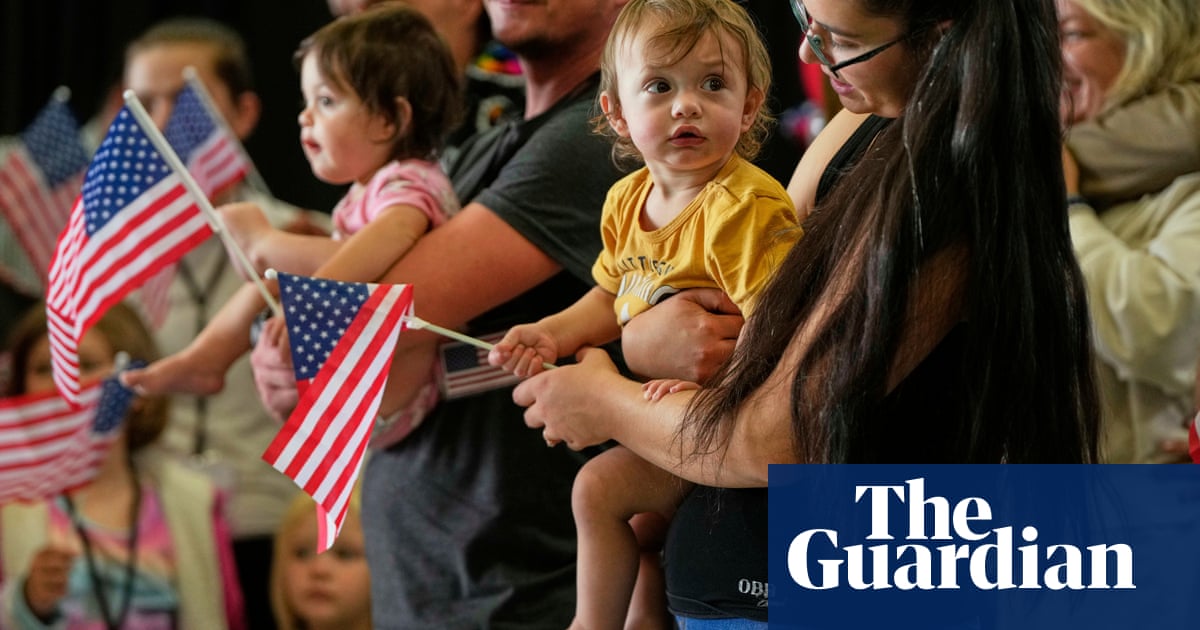Some of the children were too young to stand on their own. Instead, they sat on their parents’ knees or in their parents’ arms, waving American flags. Many of them seemed confused about what, exactly, was even happening.
But these kids were in the midst of making history: their families were among the first to take advantage ofDonald Trump’sFebruary executive order granting white South Africans refugee status in the United States, on the grounds that Afrikaner landowners – who make up just 7% of South Africa’s population yet, decades after the end of apartheid, control about half of its land – are facing persecution. While the doors to the US refugee program have been slammed shut to virtually everyone else,these Afrikaners showed up in the US earlier this week, their refugee status promising a path to US citizenship.
Days later, theTrump administrationtook a far narrower view of who deserves access to the American polity. On Thursday morning, a lawyer for the Trump administrationargued in front of the US supreme courtthat the 14th amendment does not guarantee citizenship to the American-born children of “illegal aliens” – a view contradicted by more than a century of legal precedent.
This split screen raises a vital question: is theTrump administrationreally interested in helping children and families flourish – or only the “right” families?
Over the last several months, the Trump administration’s policies on immigration, families, and children have been pockmarked by all kinds of contradictions. Theadministration is reportedly considering numerous policies toconvince people to have more children, such as “baby bonuses” of $5,000 or medals for mothers who have six or more kids. The Department of Transportation has issued a memo directing the agency to “give preference to communities with marriage and birth rates higher than the national average”. And JD Vance has proclaimed: “I want more babies in the United States of America.”
These moves are, in part, fueled by the growingpower of the pronatalism movement, which believes that the declining birthrate in the US is an existential threat to its workforce and its future.
Why, then, does the government want to exclude anestimated 150,000 babiesborn every year?
“It’s hard to look at any of these policies and not believe that they’re created for the purpose of satisfying a political base that was promised some sort of notions of recreating a nostalgia for a white Christian nationalist nation,” said P Deep Gulasekaram, a professor of immigration law at the University of Colorado Law School.
If the fate of the US workforce is really of concern,experts sayimmigration could help grow it – but the Trump administration has taken a hardline stance against immigrants from the Global South and their children. The administration has not only reportedly turned the refugee agency responsible for caring for children who arrive in the US aloneinto an arm of Ice, but also slashedfundingfor legal representation of children in immigration proceedings. Meanwhile, Republicans in Congress are trying to block parents who lack Social Security Numbers – such as undocumented people – frombenefiting from the child tax credit, even in cases where their children are US citizens.
The Trump administration has also unveiled new screening protocols that make it far more difficult for undocumented people to “sponsor”, or take custody of, children who enter the US alone. Just last week, the National Center for Youth Law and the legal advocacy group Democracy Forward sued the Trump administration over the changes, which they say have forced kids to languish in government custody. Between December 2024 and March 2025, kids went from spending an average of two months in government custody tospending an average of six.
“This administration has compromised the basic health and safety of immigrant children in egregious ways,” Neha Desai, managing director of children’s human rights and dignity at the National Center for Youth Law, said in an email.
In March, KFF, a charity that conducts health policy research,conducted focus groupsof Hispanic adults who are undocumented or likely living with someone who is undocumented. Many spoke of the effect that the Trump administration’s policies are having on their families and kids.
“I have a six-year-old child. Honestly, I’m afraid to take him to the park, and he asks me, ‘Mom, why don’t we go to the park?’” one 49-year-old Costa Rican immigrant woman told KFF. “How do I tell him? I’m scared.”
“Even the children worry. ‘Mom, did you get home safely?’ They’re already thinking that something is going to happen to us on the street,” added a 54-year-old Colombian immigrant woman. “So that also makes me very nervous, knowing that there might come a time when they could be left here alone.”
The supreme court arguments on Thursday centered not on the constitutionality of birthright citizenship, but on the legality of lower court orders in the case. Still, some ofthe justices expressed concerns about what the casecould mean for children.
Eliminating birthright citizenship, Justice Elena Kagan suggested, could render children stateless. The high court needed a way to act fast,she said.
If the justices believe that a court order is wrong, she asked, “why should we permit those countless others to be subject to what we think is an unlawful executive action?”
Both the historical and legal record make clear thatthe 14th Amendment encapsulates birthright citizenship, Gulasekaram said. But, he said, predicting the supreme court’s moves is a “fool’s errand”.
“There’s really no way of getting around the the conclusion that this is a call to some form of racial threat and racial solidarity as a way of shoring up support from a particular part of the of the of the Trump base,” Gulasekaram said. “Citizenship and the acquisition of citizenship has always been racially motivated in the United States.”
